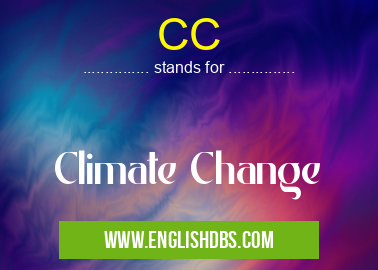What does CC mean in ACADEMIC & SCIENCE
Climate Change (CC) is a widely used abbreviation in the scientific community and beyond to refer to the long-term alterations in global or regional climate patterns. These changes are primarily attributed to human activities that increase the concentrations of greenhouse gases in the atmosphere, leading to the enhanced greenhouse effect.

CC meaning in Academic & Science in Academic & Science
CC mostly used in an acronym Academic & Science in Category Academic & Science that means Climate Change
Shorthand: CC,
Full Form: Climate Change
For more information of "Climate Change", see the section below.
What does CC Mean?
- CC stands for Climate Change.
- It refers to the long-term shifts in temperature, precipitation, wind patterns, and other aspects of the Earth's climate system.
- These changes are primarily caused by human activities, such as the burning of fossil fuels, which release greenhouse gases into the atmosphere.
Causes of Climate Change
- Greenhouse Gas Emissions: Burning fossil fuels (coal, oil, natural gas) and deforestation release carbon dioxide and other greenhouse gases into the atmosphere.
- Deforestation: Cutting down forests removes trees that absorb carbon dioxide.
- Industrial Processes: Certain industrial activities, such as cement production, emit greenhouse gases.
- Agriculture: Livestock production and agricultural practices can release methane and nitrous oxide.
Effects of Climate Change
- Rising Temperatures: Global temperatures have increased by approximately 1°C since the pre-industrial era.
- Sea Level Rise: Melting ice caps and glaciers cause sea levels to rise, threatening coastal communities.
- Extreme Weather Events: Climate change increases the frequency and intensity of extreme weather events, such as hurricanes, heat waves, and droughts.
- Ocean Acidification: Increased carbon dioxide levels in the atmosphere lower the pH of ocean water, harming marine life.
- Biodiversity Loss: Climate change disrupts ecosystems, leading to biodiversity loss.
Mitigation and Adaptation
- Mitigation: Reducing greenhouse gas emissions through renewable energy, energy efficiency, and carbon capture.
- Adaptation: Adapting to the effects of climate change by building seawalls, improving drainage systems, and developing drought-resistant crops.
Essential Questions and Answers on Climate Change in "SCIENCE»SCIENCE"
What is Climate Change (CC)?
Climate Change refers to the long-term alterations to Earth's climate system, primarily driven by human activities that emit greenhouse gases into the atmosphere. These changes manifest as shifts in temperature, precipitation patterns, sea levels, and the frequency and intensity of extreme weather events.
What causes Climate Change?
Climate Change is predominantly caused by the release of greenhouse gases, such as carbon dioxide, methane, and nitrous oxide, into the atmosphere. These gases trap heat, leading to global warming. The primary sources of these emissions are the burning of fossil fuels (e.g., coal, oil, gas), deforestation, and certain industrial processes.
What are the Impacts of Climate Change?
Climate Change has widespread and significant impacts on the environment, human societies, and the global economy. It can lead to extreme weather events, such as hurricanes, droughts, and heat waves, which can cause loss of life and property damage. It also affects sea levels, marine ecosystems, agricultural productivity, and human health.
What can be done to Mitigate Climate Change?
Mitigating Climate Change involves reducing greenhouse gas emissions and transitioning to sustainable energy sources. This can be achieved through measures such as switching to renewable energy (e.g., solar, wind), improving energy efficiency in buildings and industries, and adopting sustainable transportation practices. Additionally, protecting and restoring forests, which act as carbon sinks, can help mitigate Climate Change.
What can be done to Adapt to Climate Change?
Adapting to Climate Change involves taking measures to minimize its negative impacts and prepare for unavoidable changes. This includes building resilient infrastructure, implementing early warning systems, developing drought-resistant crops, and enhancing healthcare systems to cope with heat-related illnesses.
Final Words: Climate Change (CC) is a complex issue with far-reaching implications for the environment, society, and the economy. It is crucial to understand the causes, effects, and potential solutions to address this pressing global challenge and mitigate its impacts on the planet and its inhabitants.
CC also stands for: |
|
| All stands for CC |
